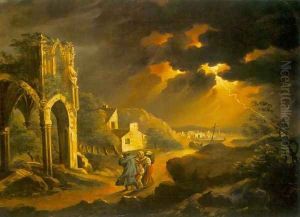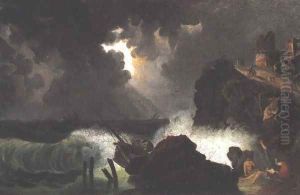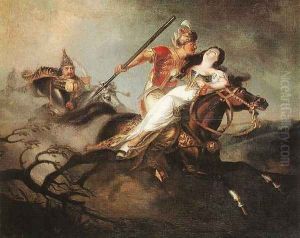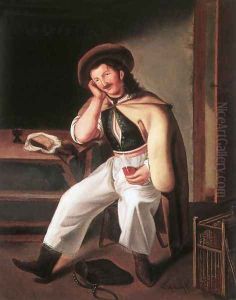Karoly Kisfaludy Paintings
Károly Kisfaludy was a Hungarian dramatist and painter, born on February 6, 1788, in Tét, Hungary. As a significant figure in early 19th-century Hungarian literature, he played a crucial role in the development of Hungarian drama and is often regarded as the founder of the Hungarian national drama. Coming from a noble family, Kisfaludy initially embarked on a military career before turning his attention to literature and painting, driven by a deep passion for the arts.
In his early life, Kisfaludy fought in the Napoleonic Wars, serving in the Austrian army. His experiences in the war, coupled with his travels across Europe, profoundly influenced his perspectives and subsequently his literary work. After leaving the military, he dedicated himself to writing and became a pivotal figure in Hungarian literature. His first significant success came with the publication of 'A Tatárok Magyarországon' ('The Tartars in Hungary') in 1819, a historical drama that received widespread acclaim for its patriotic themes and was instrumental in the revival of Hungarian theatre.
Kisfaludy's contribution to Hungarian literature was not limited to his plays. He also founded the Hungarian National Theatre in 1837 and the literary journal 'Aurora', which became a platform for emerging Hungarian writers and poets, fostering a sense of national identity and cultural pride. His work often depicted themes of heroism, national pride, and historical narratives, resonating with the Hungarian public's desire for independence and cultural revival during a period of foreign domination.
Despite facing initial resistance from the conservative literary establishment, Kisfaludy's perseverance and dedication to his craft earned him a place among Hungary's most revered writers. His legacy is not just in his plays and literary contributions but also in his role as a mentor and supporter of young Hungarian artists and writers. Károly Kisfaludy died on October 21, 1830, in Pest, now part of Budapest, Hungary. His death marked the loss of a pioneering figure in Hungarian literature, but his influence persisted, inspiring generations of Hungarian writers and contributing to the flourishing of Hungarian cultural nationalism.



